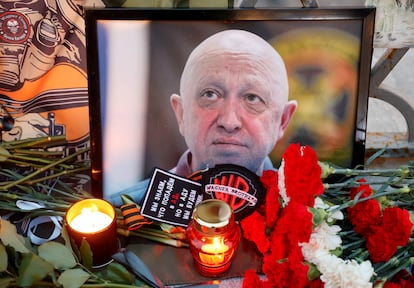Russia says it confirmed Wagner leader Prigozhin died in a plane crash
Committee spokeswoman Svetlana Petrenko said in a statement that forensic and genetic testing identified all 10 bodies recovered at the site of Wednesday’s crash

Russia’s Investigative Committee said Sunday that it confirmed that Yevgeny Prigozhin, founder and head of the mercenary force Wagner who led a short-lived armed rebellion against Russia’s military, was killed in a plane crash.
Committee spokeswoman Svetlana Petrenko said in a statement that forensic and genetic testing identified all 10 bodies recovered at the site of Wednesday’s crash and the findings “conform to the manifest” of the plane. The statement didn’t offer any details about what might have caused the crash.
Russia’s civil aviation authority earlier this week said Prigozhin, 62, and some of his top lieutenants were on the list of the passengers and crew members on board the plane. All seven passengers and three crew died when the plane plummeted from the sky halfway between Moscow and St. Petersburg, Prigozhin’s hometown.
Two months ago, Prigozhin mounted a daylong mutiny against Russia’s military, leading his mercenaries from Ukraine toward Moscow. President Vladimir Putin decried the act as “treason” and vowed punishment for those involved.
Instead, the Kremlin quickly cut a deal with Prigozhin to end the armed revolt, saying he would be allowed to walk free without facing any charges and to resettle in Belarus. Questions have remained, however, about whether Prigozhin eventually would face a comeuppance for the brief uprising that posed the biggest challenge to Putin’s authority of his 23-year rule.
A preliminary U.S. intelligence assessment concluded that an intentional explosion caused the plane to go down. As suspicions grew that the Russian president was the architect of an assassination, the Kremlin rejected them as a “complete lie.”
One of the Western officials who described the initial assessment said it determined that Prigozhin was “very likely” targeted and that an explosion would be in line with Putin’s “long history of trying to silence his critics.”
Prigozhin’s second-in-command, Dmitry Utkin, as well as Wagner logistics mastermind Valery Chekalov, also were killed in the crash. Utkin was long believed to have founded Wagner and baptized the group with his nom de guerre.
The fate of Wagner, which until recently played a prominent role in Russia’s military campaign in Ukraine and was involved in a number of African and Middle Eastern countries, has remained uncertain.
After the mutiny, the Kremlin said Prigozhin would be exiled in Belarus, and his fighters were offered three options: to follow him there, retire or enlist in Russia’s regular army and return to Ukraine, where Wagner mercenaries had fought alongside Russian troops.
Several thousand Wagner mercenaries opted to move to Belarus, where a camp was erected for them southeast of the capital, Minsk.
Sign up for our weekly newsletter to get more English-language news coverage from EL PAÍS USA Edition
Tu suscripción se está usando en otro dispositivo
¿Quieres añadir otro usuario a tu suscripción?
Si continúas leyendo en este dispositivo, no se podrá leer en el otro.
FlechaTu suscripción se está usando en otro dispositivo y solo puedes acceder a EL PAÍS desde un dispositivo a la vez.
Si quieres compartir tu cuenta, cambia tu suscripción a la modalidad Premium, así podrás añadir otro usuario. Cada uno accederá con su propia cuenta de email, lo que os permitirá personalizar vuestra experiencia en EL PAÍS.
¿Tienes una suscripción de empresa? Accede aquí para contratar más cuentas.
En el caso de no saber quién está usando tu cuenta, te recomendamos cambiar tu contraseña aquí.
Si decides continuar compartiendo tu cuenta, este mensaje se mostrará en tu dispositivo y en el de la otra persona que está usando tu cuenta de forma indefinida, afectando a tu experiencia de lectura. Puedes consultar aquí los términos y condiciones de la suscripción digital.








































